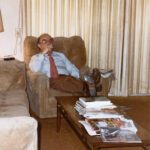Tuscarawas County Courthouse, New Philadelphia, Ohio
My small, beat-up suitcase in hand, I stood on a sun-drenched sidewalk in downtown New Philadelphia, Ohio, wondering what to do next. Surly buildings loomed over blocks of deserted streets, a reminder that it was sabbath Sunday, on a glorious summer weekend that warranted celebration, except when one had no idea where one would be sleeping that night.
A day earlier I had cleaned out my hole-in-the-wall rental on Ohio University’s campus in Athens, Ohio, three hours south of there. Spring quarter 1976 having wrapped up with the last finals on Friday, I had boxed up my books and some odds and ends and dropped them off with a friend who was staying to take summer classes. After a restless last night in the empty apartment, I had stuffed the rest of my belongings into the old suitcase and brought it with me that Sunday morning on the long bus ride to my summer job.
Only after the Greyhound coach had lumbered out of the station, down the quiet streets of the college town on break, and onto the open highways—only then had it sunk in, increasingly more dire by each traveled mile, the reality of my situation. At the start of Spring quarter I had interviewed for the job through the school’s Placement Center and had subsequently accepted an offer. There had been one minor concern, airily brushed off at the time: I had never set foot at the job location before, a town some hundred-and-forty miles away. Looking back, I should have realized the problem right then, that without the luxury of a car or telephone service I wouldn’t be able to make any arrangements prior to the move, which indeed I had not.
“It will work out all right, one way or another. Just you wait and see.” I had recited this comforting mantra to myself throughout the trip while staring out the bus window in a daze, desperate to believe my own words yet somehow not quite convinced.
But it simply had to work out. My upcoming school year was riding on it. I needed this job and a mishmash of part-time work during the year to stay afloat while continuing to attend college. Having arrived in America as an eighteen-year-old foreign student from Vietnam just a year and a half earlier, I had found myself stranded from my family back home and struggling to survive after the war ended abruptly in 1975.
And on that brilliant Sunday in June 1976, I staggered off the Greyhound bus in this unfamiliar town in central Ohio, a hobo with no place to go.
Craning my neck this way and that, hoping for any sign of rescue, I spotted a gas station up the block. Its garage was open, and inside a mechanic was peering under the raised hood of a car. I hurried and trudged over to him, the suitcase bumping against my leg with each step.
“Pardon me, sir,” I said, out of breath. “Which way is the Department of Transportation?”
Straightening up, the middle-aged man turned and stared at me curiously.
“I only have this address.” I set the suitcase down, fumbled through my pocket, and fished out the folded DOT pamphlet. “I start work there tomorrow, Monday.”
He squinted at the printed sheet, tossed me another gauging look before waving down the street. “A couple, three miles that-a-way. You driving?”
“No, sir. I rode the bus up here this morning.”
“Where you staying?”
I scratched my head. “I don’t have a place yet. Do you by chance know any place for rent?”
The man’s eyebrow arched. He reached for an oily rag, wiped his hands on it, and tossed it back down. “Just wait here. Be right back,” he grumbled before traipsing into a cubicle office in the corner. Through the glass enclosure, I watched him dial the telephone.
Upon returning, the man said with a shrug, “Can’t help you, son. But hang tight. The police will be here in a jiffy.”
The police! I was still in disbelief when minutes later a patrol car turned off the street and pulled up in front of the garage. A young-looking uniformed officer jumped out and sauntered up to the mechanic, who greeted him like a long-time acquaintance. They chatted briefly, the older man motioning his head toward me a couple of times, then the tall officer headed my way.
“Starting at the DOT tomorrow, eh?” he said with a smile that set me at ease. “Need a place to stay then, don’t you? I happen to know this lady from church who rents out spare bedrooms in her house. What do you say we go check with her? It might just be your lucky day.”
As we drove to Mrs. M.’s, the kind officer remarked that her house was mere blocks away from the DOT. “It’ll be a nice stroll to work for you,” he said, nodding approvingly. And no car or bus needed. I exhaled in silent relief. It sounded too good to be true.
Indeed it was. My tense shoulders slumped when Mrs. M., a grandmotherly-looking lady, informed us that both of her spare rooms had been rented. Watching the despair on my face, she tapped a finger against her lips, thought quickly, then said, “Well, I do have an extra bed up in the attic. It isn’t much, but it’s yours if you want it. You can use the bathroom and telephone in the second-floor hallway. No cooking, though. I can give you a good deal for it.”
I almost dropped my suitcase to give her a big hug.
“Yes, ma’am. Thank you so much,” was all I could muster.
That first night in the squeaky small bed in Mrs. M.’s attic was one of the best night sleeps I’d ever had. The next morning, I reported bright and early for my first day of work at the DOT.
I was assigned to a two-man road team, Tom and Will, as their ride-along summer help. We met every morning at 7 a.m. in the maintenance group’s office in the back lot of the DOT. Tom, the senior member of the team, took charge of our day’s worklist of all the road signs to put up or repair and the traffic lights that needed their burned-out bulbs replaced. Then Will signed out the work truck from the garage, and Tom and I hopped in on the front bench alongside him with me wedged in between the two big men, and we headed out on the road.
We covered a large territory, sometimes from one end of the county to the other, routinely logging in a hundred miles or more each day. Thus, besides training on the maintenance of road sign and traffic light systems, I also got to discover the rolling countryside and the quaint small towns of central Ohio. One particular highlight was a stopover in Cadiz, a step back in time with its picturesque courthouse and public square, and, as Tom proudly pointed out, the hometown of Clark Gable, the movie star. Many a time, as we were driving back at the end of our long day, I would catch myself drowsing, my head inadvertently dropping sideways against Will’s or Tom’s shoulder. I would startle and straighten up, but neither one ever complained or made fun about it.
Then in their fifties, the men had worked together a long time, and made a compatible team. And while they both were friendly and helpful to me, Will tended to be on the quiet side, happy to let his partner carry the bulk of the conversation. I knew very little about him, except that he was unmarried and apparently popular with the vivacious waitresses at the roadside cafés where we sometimes stopped in on breaks. They doted on him, and he seemed to quietly soak it all in.
“You’d never guess the guy had been through hell and back, would you?” Tom let slip one day as we were watching Will exchange pleasantries with one of the ladies. Tom then went on to share that as a young man Will had served in the European theater during World War II.
“Whatever the heck he’d seen over there with his own eyes, he never breathed a word about it after he got back,” Tom said. “He did mention, though, he’d run across a German cousin of his that had been captured prisoner by the Allies. Blows my mind every time when I think how them two cousins could easily have fought and killed each other without even knowing.”
The revelation cast Will in a whole new light in my eyes. I felt closer to him, a kind of kinship that grew out of having something unique in common—in our case, the nasty secret of war, albeit from two different eras. I made a note to myself to try and get to know him better, maybe learn more about his war experience and share mine with him.
Regrettably, I would not have the opportunity to do either.
One Friday afternoon, three weeks into my training with Tom and Will, the boss called all three of us into the office after we returned from our daily drive around the county.
“We’re moving you to the Drafting Department in the front office starting on Monday,” he announced to me, as Tom and Will looked on in silence. “It’s a better fit for you up there.”
Catching the disconcerted look on my face, he cleared his throat then continued in a softer voice, “Besides, you won’t have to put up with all that shouting anymore. There’s no reason on earth to keep subjecting you to that nonsense.”
It finally dawned on me what he was talking about. Our maintenance office was at the end of the DOT back lot, beyond the garage. There was this stern-looking man working in the garage who would rush out and holler at me every morning as I strode past it on my way to the office. I could never make out his angry rantings, let alone understand what brought them on. Until Tom pulled me aside one day and said, “Don’t pay the guy no mind. He happens to be a Vietnam vet, going back a few years. Had a real rough time over there, from what I heard. Anyway, he found out where you’re from, and so he’s venting his frustration and lashing out at you.”
“It’s all right, Tom,” I sputtered, putting on a brave face despite the shock. “I understand.”
I really did, although at the same time it scared and saddened me to witness the traumatic effect of war on other people, the same war that had devastated my home country and broken up my family. But I was just a young and vulnerable kid, too inexperienced and unsure of myself to know how to diffuse a potential confrontation or to reach out with a comforting hand. In the end, management must have deemed the situation dicey enough to warrant my removal from it. Just as I was getting in the groove with my road team.
“We’re all just looking out for you, kiddo,” Tom spoke up with a sympathetic smile, while Will gave me a wink of encouragement. “You’ll do fine up front. But don’t be a stranger now. Come on back and say hi anytime, you hear. We’re sure going to miss having you ride with us.”
And so would I—more than I could express on the spot.
Whatever apprehension I might have had about my transfer to a different group was quickly assuaged by my new boss, Joe. Outgoing and soft-spoken, he acted as my mentor and made sure that I felt welcome in his group and received proper training on my new task of engineering drafting. As the head civil engineer, he often took field trips to conduct topographic surveys and would bring me along on a number of those. I learned a lot that summer under Joe’s tutelage. He was a patient and giving teacher, not only on technical matters, but also generous with his advice on career choices and life in general. Thinking it might do me good to have peers of my own age group to hang out with, he planned to introduce me to his two sons but ultimately couldn’t make it happen due to all our different schedules.
Our hours at the DOT went from seven in the morning to three in the afternoon, which left me with long summer evenings and much free time on my hands. By chance, I overheard my coworkers talk about a job opening at the gas station across the business road from the DOT, for a second-shift attendant. One evening after work, on the spur of the moment, I crossed the street and stepped into the gas station’s small office that doubled as a mini convenience store, and applied for the job.
“Aren’t you bushed after a long workday?” queried Ed, the thirty-something manager, as he scrutinized me over his glasses after learning about my job at the DOT. “And yet you still figure you can swing a whole ‘nother shift being on your feet?”
“Yes, sir. That won’t be a problem at all. I love to keep busy,” I answered in all sincerity, for activity of any kind would be preferable to being cooped up in my hot, cramped space in the attic with nothing to do. Then, dropping my voice, “And I sure can use the money for school.”
Shaking his head slowly, he took another tack. “And how you going to make it here at three when you don’t get off your morning job until then?”
“If you could give me an extra five minutes to run over here from across the street, sir, I’ll report to work at three-oh-five sharp every day,” I pleaded.
Ed gazed at me for a long minute before bouncing out of his chair. The interview must be over. It was worth a try, I thought, and consoled myself and swallowed a sigh of disappointment.
“I’ll give you a trial run,” he said instead, clapping his hands conclusively as I looked up in stunned silence from my seat. “We’ll play it by ear, see how it goes. You’ll have until three-thirty to grab a quick bite before the shift. Starting tomorrow.”
Luckily I passed the test and got to keep the job for the rest of the summer. This was back in the days of the fifty-five-cent gallon and full service. Rain or shine, no matter how late, every time a vehicle pulled into the station, I would dash out to fill up its tank, check the oil, and wipe its windshield, all the while keeping a vigilant eye on the convenience store inside the office. I was also to sign for deliveries of gas and merchandise and to close up at night, after recording the level in the underground storage tank, tallying the cash receipt, and dropping it in the secure floor safe.
The job was physical enough to serve as a good diversion from the long hours bent over the drafting tables at the DOT. It also provided me with a social outlet through interaction with interesting customers from various walks of life: people from around the neighborhood, passing-through travelers, truck drivers, bikers—some of them were demanding and downright difficult, but the majority quite friendly and conversational. There was also a bright-eyed and chatty ten-year-old boy from the area that sometimes wandered over and hung around the office-store during lull times. He was filled with curiosity and wonder and bubbled with questions I didn’t always have answers for, but I rather enjoyed having my little friend around.
Ed, the young manager, also happened to be a Vietnam veteran. A sensible, hardworking, and gregarious man, as I would come to know him, he had not been embittered by the war experience, and was eager to share fond memories of the people he had met in country or show off a smattering of Vietnamese words he still remembered. Over time we became good friends, and he invited me to his house to meet his family. Full of fun and surprises, Ed once showed up at my place on a day off to drag me out to go canoeing on the nearby Tuscarawas River. “You have got to come,” he said with his hearty laugh, wagging a finger at me. “All work and no play makes Jack a dull boy, haven’t you heard?”
The two full-time jobs kept me plenty busy that summer, allowing me to earn more money than I had expected to, enough to relieve my immediate financial worries. The packed schedule also left me with little time or energy to dwell helplessly on my personal situation—how much I missed my home and family in Vietnam, and how worried I was about them. Looking past the sadness and loneliness, however, I was grateful for the kindness of strangers who did not think twice to offer a helping hand and give me a chance when I most needed it. These fortuitous encounters, and the friendships they fostered, brought me great comfort and restored my confidence and optimism.
What made that summer even more memorable was the serendipity that led me to cross paths—all within a brief window in time, in a place I had never been before—with three men whose lives, like mine, had been touched by war. We all bore scars from it, some more than others, but I learned a simple truth from Will and Ed over those short months: That no matter our different backgrounds, we could find ways to reach out and lend support even as we forged our own paths to move on from the past.
For all the positive changes and new friends it introduced into my life, summer 1976, the bicentennial summer, forever remains my summer of hope.
C. L. Hoang
C. L. Hoang was born and raised in Vietnam during the war and came to the United States in the 1970s. He graduated from Ohio University and the University of California, Berkeley, and earned his living as an engineer until bitten by the writing bug a few years back. He has since published a novel, a travelogue, and a collection of stories. His writing has also appeared in The Louisville Review, Tipton Poetry Journal, and Mount Hope Magazine.








